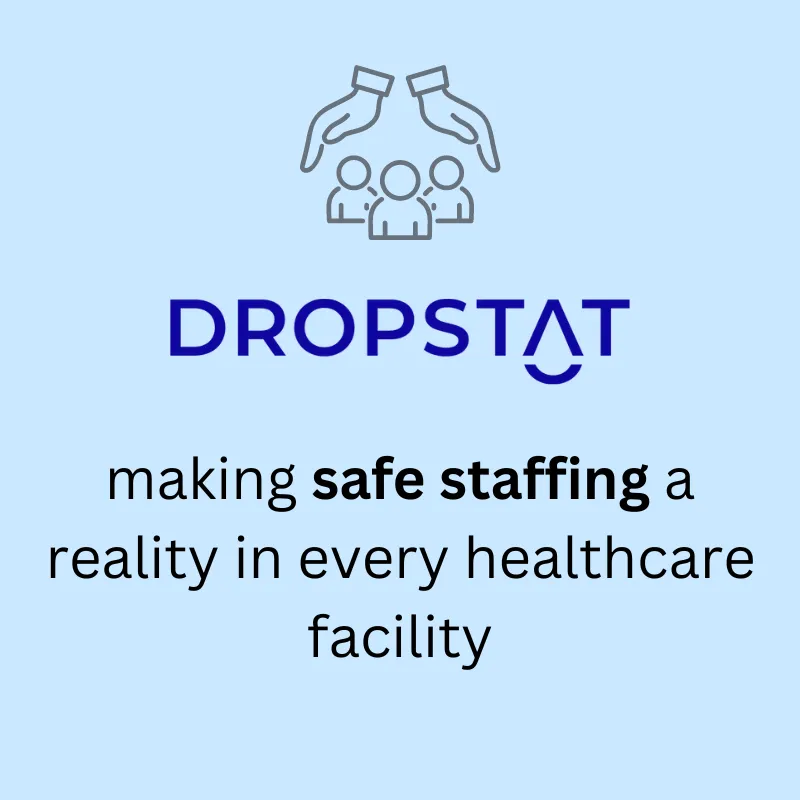Dropstat’s Clickable Guide to Types of Nursing Specialties
GNAs are certified to work in a wide variety of geriatric care environments, including:
- adult daycare centers
- Alzheimer’s care facilities
- home-care agencies
- hospitals
- independent living communities (such as continuing care retirement communities)
- long-term care facilities (nursing homes, residential care homes, skilled nursing facilities, and assisted living facilities) and
- physician’s offices
What does a geriatric nursing assistant specialize in?
GNAs care for elderly patients while understanding their specific needs, such as having several co-morbid conditions.
While the different types of nurses (RNs, NPs, LPNs, CNAs) and home health aides (HHAs) may look after the elderly, GNAs specialize in providing assistance and essential nursing services to patients over the age of 65, usually while working under the supervision of nurses and physicians.
Geriatric nursing assistant training focuses exclusively on satisfying the daily living and non-medical needs of the elderly population. A GNA’s skills and personal qualities must be suitable for working with the elderly.
The Bureau of Labor Statistics sees a 20% increase in demand for GNAs from 2018 until 2028 due to the number of people in the U.S. who will be over the age of 65. People at this age are the prime clientele of GNAs.
Geriatric nursing assistant’s scope of practice
Geriatric nursing assistant duties center around hands-on care where the skills and training of licensed nurses are not required.
GNAs help elderly patients with
- personal care for “activities of daily living” (personal hygiene, bathing, restroom use, dressing and grooming, eating, transfer, and ambulation)
- taking and recording vital signs
- provide emotional support
- respond to patients’ calls
- serve meals
- ensure optimum hydration
- make patient beds
- monitor patient well-being
- repositioning patients
- look out for side effects of medication
GNAs may work in all shifts: daytime, evening, night shifts, and weekends. Overtime is usually subject to the approval of a superior.
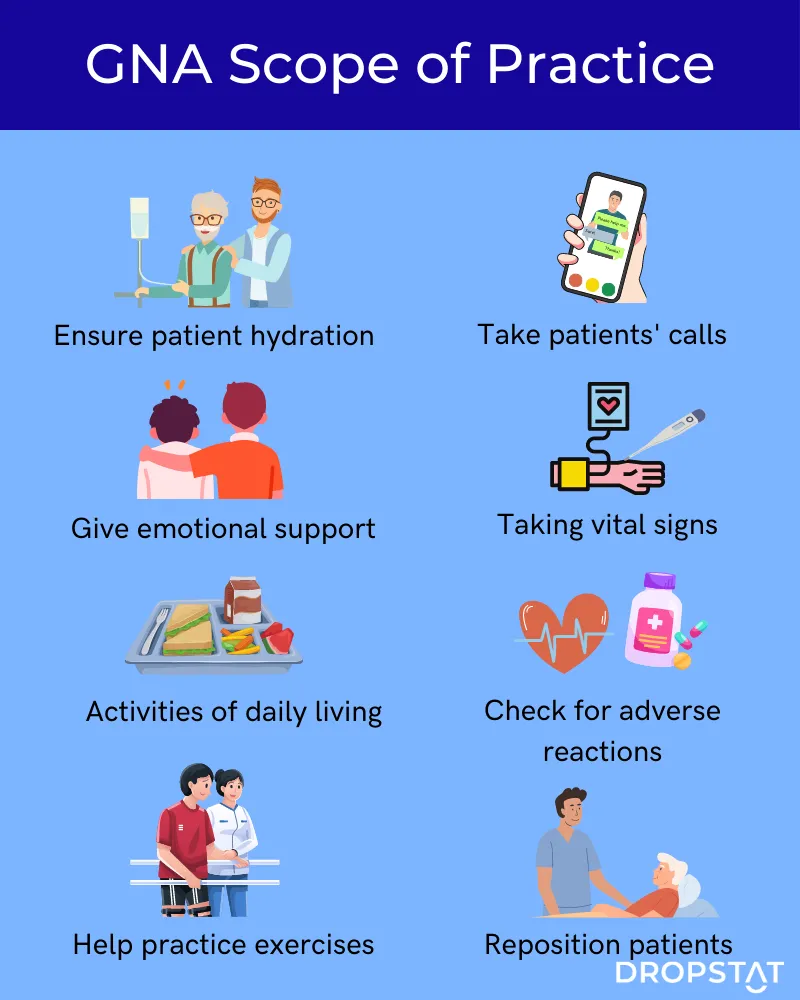
Duties excluded from GNA certification
GNAs are not trained as extensively as licensed nurses, so they are prohibited from assisting with medical nursing activities.
A GNA may not:
- administer medications
- insert/remove tubes
- tube feeding
- change sterile dressings
What is a GNA’s salary
Most GNAs earn an hourly wage. Some receive a salary. The average annual salary for a GNA in the United States is $23,210 or $11.14/hr. according to information about Nursing Assistants and Orderlies given by the Bureau of Labor Statistics, but it varies considerably from state to state. For the sake of comparison, the annual wage of a GNA in New York is $26,790 (16% higher than the average), and in Massachusetts, it is $39,793 (22% above the average), but in Mississippi, the annual wage is $17,610 (24% below the national average).
Many other factors influence a GNA’s salary apart from the state:
Aspects such as the breadth of experience, location of the healthcare facility, and type of employer make a considerable difference to a GNA’s salary.
Additionally, GNAs who work full-time, on night shifts, or over the weekend will command a higher salary
Hospitals tend to pay GNAs more than long-term care facilities. Additionally, larger facilities tend to pay GNAs more than smaller facilities and have a range of benefits built into the salary (such as pension and healthcare plans). Facilities in rural settings tend to pay less.
Geriatric nursing assistant certification
Geriatric nursing assistant education requirements are lower than for other nursing positions. People can easily enter the nursing field by becoming a GNA with a short training program for competency. This is useful when a facility needs new long-term nursing assistant staff at short notice.
It takes around one year to study and pass the state geriatric nursing assistant examination. Many GNAs are already working as they qualify. GNAs must pass the state exam to be listed on the state GNA registry.
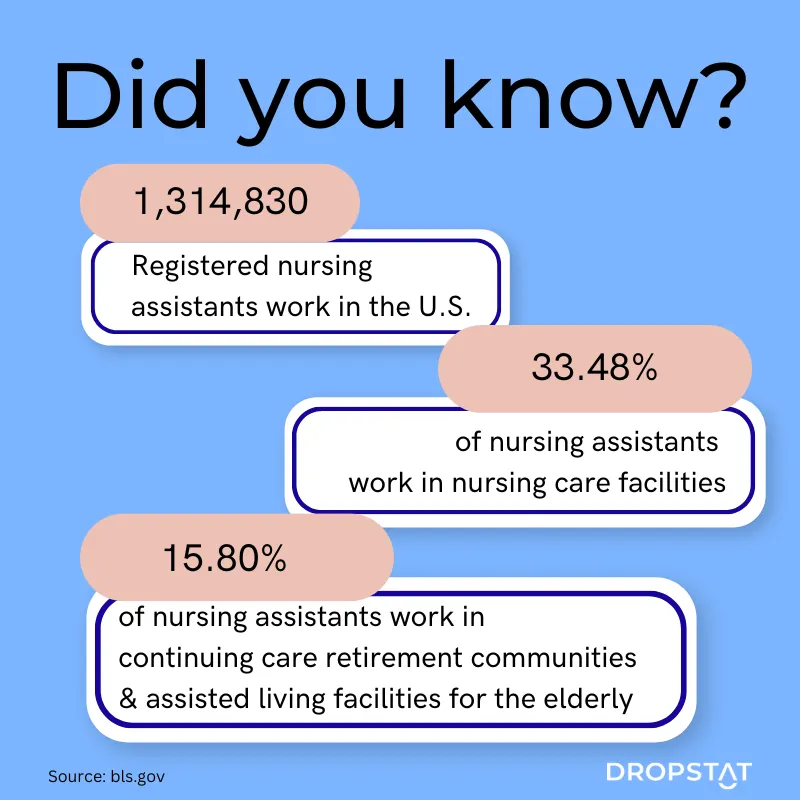
Continuing education for the geriatric nursing assistant
Specializing in particular skills raises a GNA’s competency. In some states, a GNA may complete additional studies to become a Certified Medicine Aide (CMA). GNAs can also study to become Certified Geriatric Nursing Assistants (CGNA). With their new skill set, they would command higher wages. Likewise, GNAs with many years of experience can demand a higher salary. However, a GNA salary is usually lower than the salary of a licensed nurse with similar experience.
Some advantages of employers encouraging GNA continuing education:
- Competency: More competent GNAs can assist nurses with a wider range of healthcare needs
- Employee morale: Career advancement keeps employee morale high, which leads to lower turnover rates.
- Increased knowledge leads to better patient care: It improves the quality of patient care and outcomes, for example, through improved patient advocacy.
- Staffing solution: It may answer the problem of staff shortages in certain skills and reduce the need for the recruitment of new staff.
How long does GNA certification last?
The GNA certification card must be renewed every two years. There is no cost for renewal.
Can you hire a nursing assistant who is qualified in another state?
CNAs and GNAs often work as travel nurses, which is a solution for short-staffing issues. States with license reciprocity agreements allow nurses to transfer certification from one state to another. Nurses need to complete an application for reciprocity.
Rules differ from state to state, but some states allow working for up to 120 days before administering a written test for out-of-state nurses. Other states require nurses to apply for state certification without further training or testing after providing recent work experience.
CNA vs. GNA
CNAs and GNAs perform similar jobs. The main difference between a CNA certification and a GNA is the amount of studying that must be completed. GNAs must pass a state exam, but CNAs do not have such a requirement. Also, GNAs work exclusively with the elderly, while CNAs work with all patients.
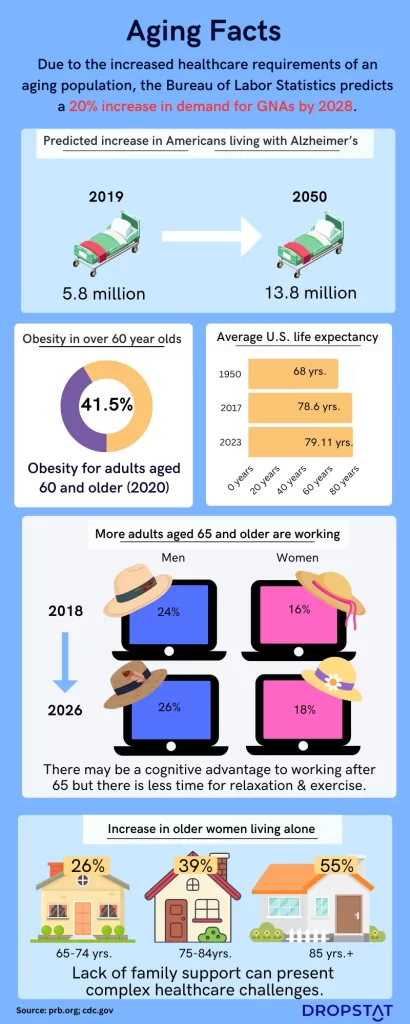
Why would a facility need to hire GNAs? What are the benefits of hiring GNAs?
GNAs bring valuable skills and manpower to a facility and can raise the quality of patient care at a budget cost. The average GNA salaries quoted above are much lower than those for other nurses. A registered nurse has an annual average salary of $71,730; an LPN costs $45,090; and travel nurses earn an average annual salary of $74,280. However, since a GNA specializes in working with elderly patients, a GNA receives a higher salary than a CNA.
Since it is easier to achieve GNA certification and GNAs are cheaper to hire, GNAs in any state can provide the answer to staffing shortage issues. When GNAs handle lower-level, hands-on patient issues, it frees up higher-level nurses to complete administrative objectives or medical nursing tasks.
When GNAs work as travel nurses, they are much more expensive to hire through an agency on a short-term basis. It’s more economical to hire permanent GNA staff. Since GNA annual pay is far below other nurse types, the real saving is significant.
How Dropstat helps fill shifts effectively and make data-based decisions about the need to hire GNAs
Dropstat helps with safe staffing planning and the need to hire more GNAs through its AI-powered scheduling interface.
Dropstat’s shift tracking tool allows schedulers to see at a glance which shifts are lacking staff and which skills are needed to fill those shifts. So if a shift is lacking nursing assistants, schedulers will then send out shift requests to less qualified nurses like GNAs. This cost-efficient, effective staff scheduling alleviates higher-qualified nurses from carrying out lower-level personal care tasks. Nurses are then available for more demanding medical tasks, which helps the entire facility run more effectively and efficiently.
In addition to this, Dropstat tracks shifts that are continuously short-staffed and alerts management of the recurring need for more shift coverage with the hiring of permanent staff in the form of lower-level nurses such as GNAs. This will ensure that optimal patient care is provided at all times without having to pay for expensive, highly qualified nurses.
Schedule a demo with Dropstat to find out which shifts can be economically filled with GNAs to overcome staffing shortages in your facility.
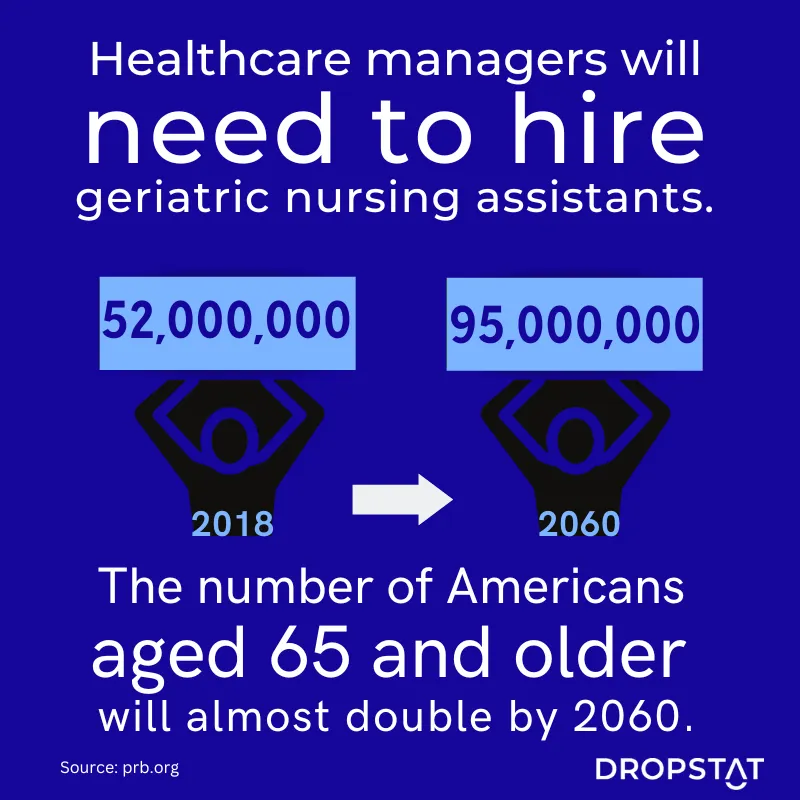
FAQs about GNAs
What is a GNA in the medical field?
A geriatric nursing assistant, GNA, becomes a certified nurse when they successfully complete a state GNA exam and fulfill federal requirements for working with adult patients 65 years and older. GNAs fill an essential role as nursing assistants working under licensed nurses in nursing homes, hospitals, licensed comprehensive care facilities, or assisted living facilities.
GNAs provide one on one care to elderly people for daily activities. They do not dispense medicine unless they have qualified as medicine aides. GNAs are in an entry-level position, yet are more qualified than home health aides and certified nursing assistants. Some nurses earn their GNA license as a step towards becoming a certified medical assistant, CMA, or to pursue gerontological nursing certification.
What are the pros of hiring a geriatric nursing assistant?
Here are several pros to hiring certified GNAs for hospitals, licensed comprehensive care facilities, and every type of senior nursing home.
– GNAs provide hands-on assistance to older patients. This improves patient experience and the quality of patient care.
– GNAs are trained to specialize in care for the elderly.
– GNAs take care of lower-level nursing care tasks consistently.
– Since the training for GNAs is short (within 120 days), it is easy to recruit and include them in a healthcare team. It is a flexible and immediate solution for shortages.
– GNAs are relatively inexpensive. The average hourly pay for a GNA is just $11.14, but for a registered nurse, it is $38.74 (U.S. Bureau of Labor Statistics).
– Training for people who are becoming GNAs begins in a community college or a high school located in local neighborhoods. This means that candidates are locally sourced and very accessible.
